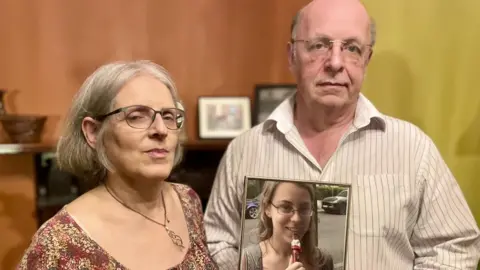Natasha Abrahart: University contributed to student's death, court upholds
 Family picture
Family pictureA university's appeal against a judgement that it contributed to the death of a student by discriminating against her has been rejected.
Natasha Abrahart, 20, took her own life in April 2018 on the day she was due to take part in a group presentation at the University of Bristol (UoB).
Ms Abrahart had been suffering from chronic social anxiety disorder.
The High Court upheld the decision that the university had failed to make reasonable adjustments for Ms Abrahart.
But the judge refused to say whether or not universities owe their students a duty of care, saying a ruling on the issue is "not necessary".
Prof Evelyn Welch, vice-chancellor and president of the UoB, said: "Natasha's death is a tragedy - I am deeply sorry for the Abrahart family's loss.
"At Bristol, we care profoundly for all our students and their mental health and wellbeing is a priority and is at the heart of everything we do."
Speaking after the ruling Ms Abrahart's father, Dr Robert Abrahart, said: "It has been a long and painful journey to reach this point, and the University of Bristol has fought us every step of the way.
"The result is that we now have a judgment from the High Court confirming what we always knew to be true.
"The University of Bristol failed our daughter, broke the law, and contributed to her death."
 BBC/ Hazel Shearing
BBC/ Hazel ShearingOn the day Ms Abrahart, from Nottingham, was found in her flat, she had been due to deliver a presentation in front of more than 40 students in a 329-seat lecture theatre.
The physics student was in her second year of university when, according to family, "things started to go wrong" as she was required to complete oral assessments as part of her course.
Dr Abrahart brought legal action against the university alleging it had contributed to his daughter's death by discriminating against her on the grounds of disability.

BBC Education Correspondent Hazel Shearing:
The judge who handed down today's ruling has been considering an issue that calls into question the very purpose of universities: whether or not they have what is called a "duty of care" towards their students.
That legal duty is what Natasha Abrahart's parents have been campaigning for, arguing that following "best practice" isn't enough.
This judge was considering whether universities must take "reasonable steps" to avoid students coming to harm, and whether universities have a duty not to cause such harm.
If he had found that they did have such a duty, it could have changed the way universities are expected to look after their students - and prompted legislation.
But what it would like in practice is not clear, and some campaigners have told the BBC that it feels too theoretical to support.

During a five day trial in March 2022, Bristol County Court heard that Ms Abrahart had made a prior suicide attempt in the winter term, and university staff were aware she was struggling.
A judge ruled the university had breached its duties under the Equality Act by failing to make "reasonable adjustments" for Ms Abrahart in light of her debilitating anxiety, which is considered a disability.
The judge dismissed a claim that the university had been negligent and ordered the university to pay damages of £50,500.

In December last year, the university appealed this ruling on the basis that the judge was wrong to find that it knew, or should have known, enough about Ms Abrahart's condition to make exceptions.
Lawyers for the university added the institution had acted reasonably "given the importance of maintaining academic standards, and fairness to other students".
However, in a 62-page judgement delivered earlier, Mr Justice Linden ruled that the university had failed on all seven of its grounds of appeal.
He found the university had not provided sufficient evidence in its argument that "the assessment of a student's ability to explain laboratory work orally" was "a core competency of a professional scientist".
Dr Abrahart said: "Their arguments that they did not know enough about Natasha's problems, or that they hadn't received the right paperwork, or that fairness to other students meant they couldn't make the adjustments she needed, have now all failed for a second time.
"It is now for the University of Bristol, and higher education institutions across the country, to get their houses in order."

Gus Silverman, a solicitor representing the family, said: "So far as we are aware this is the first time the High Court has considered arguments that disability discrimination has contributed to a person's death.
"Upholding the finding that Natasha's death was linked to this kind of unlawful treatment therefore establishes a powerful legal precedent."
However, having dismissed the university's appeal, Mr Justice Linden concluded that it was "not necessary" for him to "express any view, one way or the other" in relation to whether or not universities owe their students a duty of care.
Judge Alex Ralton had previously dismissed the claim of negligence in 2022 on the basis that the university did not owe Ms Abrahart any relevant common law duty of care because "as a disabled student… she is afforded protection by the Equality Act 2010".

Standing outside the Bristol Civil Justice Centre, Ms Abrahart's mother, Maggie, delivered a statement addressed to the vice chancellor of the university.
"We want you to read this judgement very carefully and follow its lessons," she said.
"We want you to think how you would wish your son or daughter to be treated at university if they were disabled and needed their rights protecting."
She added that they have been campaigning for Parliament to pass a statutory duty of care, a petition for which gained 128,000 signatures before it closed.
It would require all universities to act with reasonable care and skill so as to avoid causing harm to students.
Prof Welch said the university was continuing to develop and improve its services and safeguards to support students who need help.
She added: "In appealing, we were seeking clarity for the higher education sector around the application of the Equality Act when staff do not know a student has a disability, or when it has yet to be diagnosed.
"Higher education staff across the country share our deep concern about the increase of mental health issues amongst young people, and with that rise comes the increasing importance that staff, students, and their families are clear on what support universities can and should provide, and that students receive appropriate specialist care under the NHS should they need it."
The professor said UoB received the University Mental Health Charter Award in 2022, adding: "We know there is always more to do, and we will keep working to achieve the best for everyone in our community."

If you've been affected by the issues raised in this report, the BBC Action Line has a list of organisations that may be able to help.

Follow BBC West on Facebook, X and Instagram. Send your story ideas to: [email protected]
